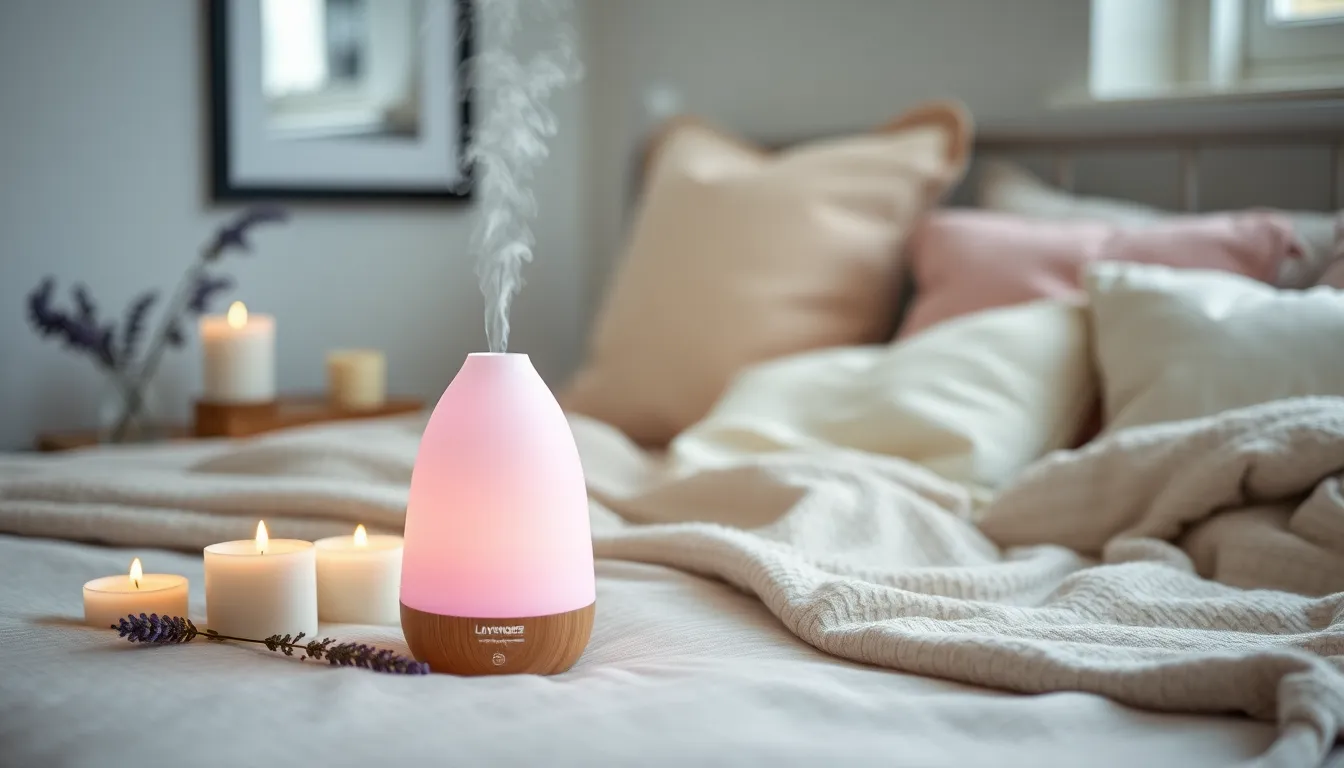Table of Contents
ToggleTossing and turning at night? It’s like a bad dance party where sleep is the DJ that never shows up. If counting sheep feels more like a chore than a remedy, aromatherapy might just be the secret weapon you need. Imagine drifting off to dreamland surrounded by soothing scents that whisk you away to a peaceful slumber.
Aromatherapy isn’t just a fancy word for smelling good; it’s a powerful tool that taps into the mind-body connection. With the right essential oils, bedtime can transform from a struggle into a serene escape. Lavender, chamomile, and sandalwood are more than just pretty fragrances—they’re your new sleep buddies. So kick insomnia to the curb and let the calming aromas guide you to a night of restful sleep.
Understanding Aromatherapy for Sleep
Aromatherapy leverages essential oils to promote relaxation and improve sleep quality. Various essential oils possess unique properties that help calm the mind and body. Lavender oil consistently stands out for its sedative effects, often cited in studies for reducing anxiety and enhancing sleep.
Chamomile oil also plays a significant role in sleep enhancement. Known for its soothing qualities, it is frequently used in teas and diffusers to create a tranquil atmosphere before bedtime. Sandalwood oil, with its rich earthy scent, has been shown to decrease restlessness and support deeper sleep patterns.
Creating a calming bedtime routine can maximize the benefits of these oils. Diffusing essential oils in the bedroom shortly before sleep helps individuals unwind and prepare for rest. Combining oils, such as lavender with chamomile, often yields a more profound effect, enhancing the soothing experience.
Different methods of application can also influence effectiveness. Inhalation remains a popular technique, where breathing in the scent directly from the bottle or diffuser provides immediate effects. Additionally, topical application of diluted oils on pulse points can foster a deeper sense of relaxation.
The use of aromatherapy for sleep presents an accessible and holistic approach to combatting insomnia. Individuals seeking alternatives to pharmaceuticals may find these natural solutions effective in achieving restful nights. By incorporating specific oils into nighttime routines, transformative changes in sleep quality may emerge.
Benefits of Aromatherapy for Sleep

Aromatherapy offers several advantages for enhancing sleep quality. Utilizing essential oils can lead to notable improvements in relaxation and restfulness.
Stress Reduction
Engaging with essential oils like lavender creates a tranquil atmosphere, reducing daily stressors. Lavender’s calming properties, well-documented in studies, have shown effectiveness in lowering cortisol levels. Chamomile stands out for its ability to soothe anxiety, promoting a relaxed state before sleep. Inhaling these fragrances signals the body to unwind, which can aid the transition to sleep. Regular use can condition the mind to associate these scents with relaxation, further alleviating stress over time.
Improved Sleep Quality
Essential oils also contribute to achieving deeper, more restorative sleep. Studies indicate that lavender oil can enhance sleep quality by prolonging slow-wave sleep cycles. Sandalwood oil supports this by decreasing restlessness, enabling individuals to remain asleep longer. Incorporating these essential oils into evening routines, such as using diffusers or applying them topically, maximizes their soothing effects. Creating a calming environment rich with pleasant scents directly correlates with improved sleep outcomes, making aromatherapy a practical approach for better rest.
Common Essential Oils for Sleep
Essential oils can greatly enhance sleep quality, with several specific oils standing out for their calming properties. Users often turn to these oils to reduce anxiety and create a restful environment.
Lavender
Lavender oil is renowned for its ability to promote relaxation and sleep. Studies show that inhaling lavender can increase slow-wave sleep, a critical phase for restorative rest. Many people use lavender in diffusers or add it to baths for a calming experience. Its floral aroma pairs well with bedtime rituals, signaling the body to unwind. Topical application on pulse points can further enhance its effects, making it a versatile choice for those seeking serenity.
Chamomile
Chamomile oil is another favorite known for its soothing qualities. Its gentle scent works wonders in alleviating stress and anxiety, making it an excellent pre-bedtime option. Users often enjoy chamomile tea or apply the oil through diffusers before sleep. This oil’s calming effects help reduce the time it takes to fall asleep while improving overall sleep quality. Many individuals find that incorporating chamomile into their routines creates a peaceful atmosphere conducive to rest.
Cedarwood
Cedarwood oil offers distinct benefits for sleep support. Its warm, woodsy aroma promotes a sense of comfort and grounding. This oil works by increasing levels of serotonin in the brain, which can convert to melatonin, aiding in sleep regulation. Diffusing cedarwood oil in the evening creates a cozy environment that encourages relaxation. Many users appreciate adding cedarwood to their skincare routines, combining wellness with self-care in preparation for sleep.
Methods of Using Aromatherapy for Sleep
Various methods exist for incorporating aromatherapy into sleep routines. Each technique highlights the unique benefits of essential oils.
Diffusers
Diffusers play a significant role in making aromatherapy accessible at bedtime. By dispersing essential oils into the air, they create an inviting atmosphere. Lavender oil, chamomile oil, and cedarwood oil work well in diffusers, producing calming effects that prepare the mind for sleep. Users typically turn on the diffuser 30 minutes before sleeping, allowing the scents to saturate the room. This method offers continuous fragrance, which encourages relaxation throughout the night. As a result, it enhances overall sleep quality.
Topical Applications
Topical applications offer another effective way to use essential oils for sleep. Mixing oils with a carrier oil provides a safe way to apply them directly to the skin. Common areas for application include the wrists, temples, and neck, where the scent can easily be inhaled. Lavender oil often promotes calmness when applied before bedtime. Chamomile oil soothes anxiety, enhancing the relaxation process. Users benefit from lingering scents, which reinforce the connection between the essential oils and restfulness. This method invites deeper sleep and helps establish a calming bedtime routine.
Aromatherapy offers a natural and effective approach to enhancing sleep quality. By integrating essential oils like lavender chamomile and sandalwood into bedtime routines individuals can create a serene environment that promotes relaxation. These scents not only reduce stress but also help condition the mind for restful sleep over time.
Incorporating methods such as diffusing oils or applying them topically can further amplify their calming effects. As more people seek alternatives to pharmaceuticals for sleep issues aromatherapy stands out as a promising solution. Embracing these soothing scents can transform the sleep experience and lead to a more peaceful night’s rest.




